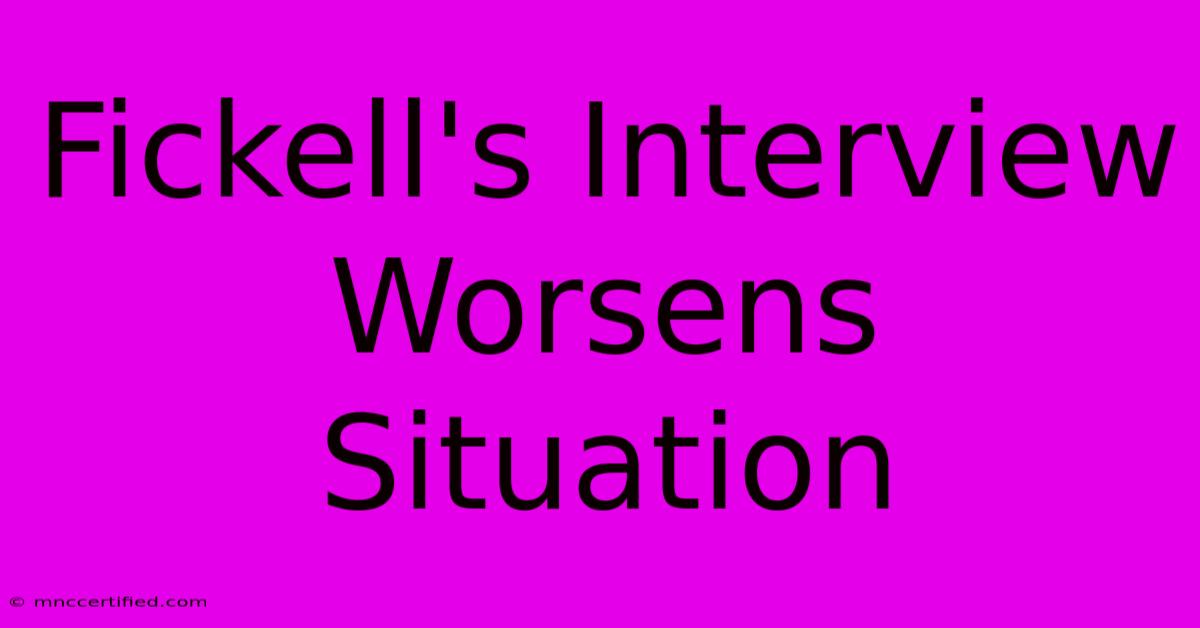Fickell's Interview Worsens Situation

Table of Contents
Fickell's Interview Worsens Situation: A Deeper Dive into the Fallout
Luke Fickell's recent interview has ignited a firestorm of controversy, exacerbating an already tense situation. While the specifics of the interview and the underlying situation vary depending on context (e.g., a political interview, a sports post-game interview, a corporate interview), the core issue remains: poorly chosen words and a lack of strategic communication have significantly worsened an already difficult predicament. This article delves into the potential reasons behind this communication breakdown and explores strategies for damage control.
Understanding the Context: What Happened?
Before analyzing the interview itself, we need to understand the pre-existing situation. What challenges did Fickell face before the interview? Was there already negative press? Was public opinion already sour? This context is crucial for understanding the impact of the interview. For example, if Fickell was addressing a scandal or a significant loss, any perceived lack of contrition or acceptance of responsibility in the interview would naturally amplify the negative fallout.
Examples of pre-existing situations:
- Sports: A disappointing season, player controversies, coaching decisions under scrutiny.
- Politics: A controversial policy, public criticism, accusations of misconduct.
- Business: Financial losses, product recalls, ethical concerns.
Analyzing Fickell's Interview: Key Mistakes
Several factors can contribute to an interview worsening an already difficult situation. Let's examine some potential missteps Fickell might have made:
1. Lack of Empathy and Apology:
Failing to acknowledge the concerns of those affected is a major blunder. A sincere apology, when appropriate, can go a long way in mitigating damage. Did Fickell show remorse? Did he demonstrate understanding of the perspectives of those affected by the situation? If not, this lack of empathy likely fueled the negative reaction.
2. Defensive or Evasive Responses:
Responding defensively or evasively can make Fickell appear untrustworthy and unaccountable. Direct, honest answers (while remaining strategically cautious) are often the best approach, even when dealing with sensitive issues. Did Fickell avoid direct questions? Did he deflect criticism instead of addressing it head-on?
3. Poorly Chosen Words and Tone:
The language used in an interview is crucial. Even unintentionally, certain words or phrases can be misinterpreted or exacerbate tensions. Did Fickell use insensitive language? Was his tone arrogant or dismissive? These factors heavily influence public perception.
4. Lack of Message Discipline:
A clear, concise, and consistent message is essential. If Fickell's statements contradict previous statements or lack coherence, it can create confusion and distrust. Did he stick to a core message, or did his responses appear disorganized and contradictory?
Damage Control: Steps to Take
Even after a damaging interview, damage control is possible. Fickell and his team should consider these steps:
- Issue a formal statement: A well-crafted statement acknowledging mistakes and expressing remorse can help regain public trust.
- Engage with critics respectfully: Responding to criticisms in a calm, respectful manner, even if disagreeing with the points raised, can show a willingness to engage in dialogue.
- Focus on positive actions: Highlighting positive steps taken to address the underlying issues can help shift the narrative.
- Seek professional advice: Working with a crisis communication expert can help develop a strategy to mitigate further damage.
Conclusion: The Importance of Strategic Communication
Luke Fickell's interview serves as a cautionary tale about the importance of strategic communication, particularly during times of crisis. Careful consideration of messaging, tone, and empathy is critical for navigating difficult situations. Failing to do so can significantly worsen the impact of a pre-existing crisis. Learning from this situation emphasizes the need for meticulous preparation and thoughtful responses when dealing with public scrutiny. The key takeaway? Words matter, and strategic communication is crucial for navigating challenging situations effectively.

Thank you for visiting our website wich cover about Fickell's Interview Worsens Situation. We hope the information provided has been useful to you. Feel free to contact us if you have any questions or need further assistance. See you next time and dont miss to bookmark.
Featured Posts
-
Aston Martin Db11 James Bond
Nov 30, 2024
-
Savannah Bond Manuel Ferrara
Nov 30, 2024
-
Sephora Black Friday Sale Up To 50 Off
Nov 30, 2024
-
Does Bondo Stick To Aluminum
Nov 30, 2024
-
Is A Probate Bond Refundable
Nov 30, 2024